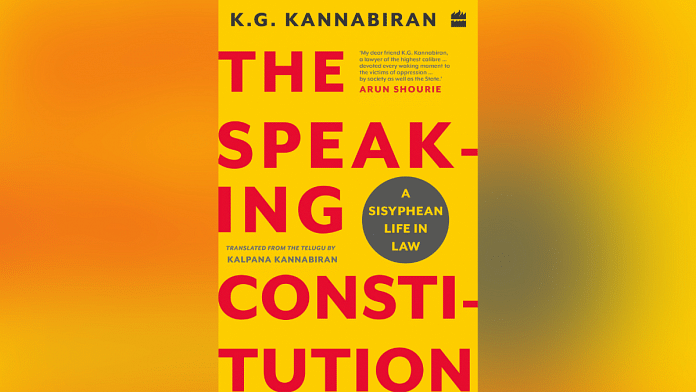New Delhi: A memoir, written over a decade ago, has been translated into English to introduce the legal geography of the country’s civil liberties movement to a new set of readers and help them get a closer look at how the idea of justice and jurisprudence evolved in Indian courts.
By traversing through tribunals and courts of different jurisdictions, the accounts in the book ‘The Speaking Constitution:A Sisyphean Life in Law’ are mainly centred around the state of Andhra Pradesh.
Published by HarperCollins India, ‘The Speaking Constitution:A Sisyphean Life in Law,’ by K.G. Kannabiran (1929–2010), who was a human rights activist and lawyer of the Andhra Pradesh High Court, will be released on 16 December on Softcover, ThePrint’s online venue to launch non-fiction books.
The book is based on the author’s 2009 Telugu language memoir and is translated into English by Kalpana Kannabiran, a sociologist and legal scholar from Hyderabad, also the author’s daughter. Essentially a memoir, this book gives one a glimpse into K.G. Kannabiran and how he devoted himself to the cause of civil liberties, human rights, justice, and dignity.
“This unfinished Sisyphean struggle has not made me tire of it; mine has been the struggle for a better world and the struggle is its own reward,” reads an undated note by the author from 2007-2008.
Kalpana Kannabiran says, “In interweaving this approach with his arguments in litigation on the reach of the Constitution, Kannabiran urged courts to take ‘insurgent’ positions in their constitutional deliberations, mindful of social and political contexts. The questions
of philosophy, law and politics embedded in his everyday travels in courts hold several lessons for our understanding of our history and our present-futures.”
Through this book, the author has mapped a legal geography of the civil liberties movement in India. Many cases are explored such as Ansari Begum’s deportation in the aftermath of Partition, the trial of Afzal Guru and the question of the death penalty and even the peace talks and negotiations between the Naxalites and the Andhra Pradesh government. By giving us a deep insight into these cases and many more, the author unfolds before us the evolution of Indian jurisprudence.
The author intersperses personal accounts with research on court proceedings, to give us a set of repertoires of real cases that shines a light on a constitutional regime.
Also read: New book traces life of Rani Durgawati, one of India’s ‘most underrated monarchs’



